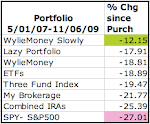I started an experiment to put together a hypothetical portfolio of no-fee no-load mutual funds, available through a single brokerage, and see if it would outperform comparable index fund portfolios. I set up the portfolios on May 1st, so Halloween was 6 months in and I figured it was time to take a detailed look at how things are going.
For those of you who don't want to read my ramblings and just want to know which portfolio won at 6 months out, the answer is the WylieMoney 20 Mostly Managed portfolio won... handily:

If you read financial magazines, websites and blogs, you'll find endless articles making the claim that index funds are better than managed funds.
Here is the latest. Articles like this one bother me because the logic is flawed.
The fundamental argument is this:
"And when you step back and look at the performance of actively managed funds vs. index funds over long periods of time, you'll find that index funds tend to beat the majority of actively managed funds."
What I take away from this is that I should not buy the majority of actively managed funds. (As if I could afford it!) What Walter (the author) implies is that managed funds are therefore, the wrong way to go. Where the logic fails for me is that what the performance of all managed funds as a group has nothing to do with the individual managed funds I invest in. If the majority of funds under perform their indexes, why not ignore the majority and pick from the minority?
Articles like this do not bother me anymore because I have come to view them as investing advice for non-investors. If I had the choice of buying 10 random managed funds vs 10 random index funds, I would go with index funds too.
For people who do not know anything about mutual fund investing, starting with index funds is not bad advice.
Whether people who do not know much about mutual funds should be investing in them at all is another topic.
Now I'm no expert. But I have learned a bit about how mutual funds work. And online screening tools make it pretty easy to sort out funds with low fees that have performed well over the long term, if you know what to look for.
So my original experiment was to see if a portfolio of 20 funds, that could be bought through a single brokerage for $50,000, would beat a portfolio of 20 Vanguard funds, a portfolio of 20 ETFs, a portfolio of 3 index funds representing the same Domestic, International equity and Bond mix as the 20 fund portfolios and a portfolio made up solely of the S&P 500.
At exactly 6 months, I took a detailed snapshot of the performance of each portfolio and will spend the next few posts sharing the details.
The 20 funds I picked are not all managed funds. In some cases, Etrade did not offer a managed fund in a particular category that I liked. The 20 Vanguard funds are not all index funds as Vanguard did not have index offerings for all the categories I chose. I should also mention that Vanguard has higher minimums for many of its funds so you could not have bought all 20 for $50,000. Also, there are some redundancies in the Vanguard 20 that are intentional. For example, the Large Cap Blend fund is a 50/50 mix of the Large cap Growth and Large Cap Value funds. So instead of $2500 in all three, I could have invested $3750 in just the Value and Growth categories and gotten the same coverage, initially. This has bugged some people but as I share the 6 month details, it will be clear why I did this. (to compare how $2500 did in each category in dollar terms).
In both 6 month performance and year to date performance the WylieMoney picks were better as a group. Since I have not been re-investing dividends and capital gains prior to May 1st, the year to date number is not 100% accurate. And 3 year performance or older would be nice to see, but all the portfolios have funds that have not been around for that long so the results won't be complete.
So to sum up, the most expensive portfolio (see chart below), the WylieMoney 20 Mostly Managed portfolio returned 8.81% compared to the 3 Index Fund portfolio which returned 7.58%, the 20 Vanguard Fund Lazy portfolio which only earned 6.92% and the 20 ETF portfolio which earned only a little more than a good online savings account at 5.63%. The SPY portfolio, representing the S&P 500 was up 4.44% just over half as much as the WylieMoney 20.
 I am amused to note that my hypothetical portfolio has also beaten my actual brokerage and retirement accounts. I take some comfort in noting that my actual accounts beat all the index and lazy portfolios as well!
I am amused to note that my hypothetical portfolio has also beaten my actual brokerage and retirement accounts. I take some comfort in noting that my actual accounts beat all the index and lazy portfolios as well!Below are snapshots of each portfolio. Click for a larger image:











1 comment:
You are choosing mutual funds that are boosting their returns by mixing with some other asset classes while the index you use to compare does not.
Take Janus Contrarian for example. It has significant exposure to emerging markets and latin america which has been hot. You are comparing apples to oranges.
At a portfolio level, if you were exposed to the asset classes in the same proportions you could do possibly do better but I guess it feels warm that way.
Post a Comment